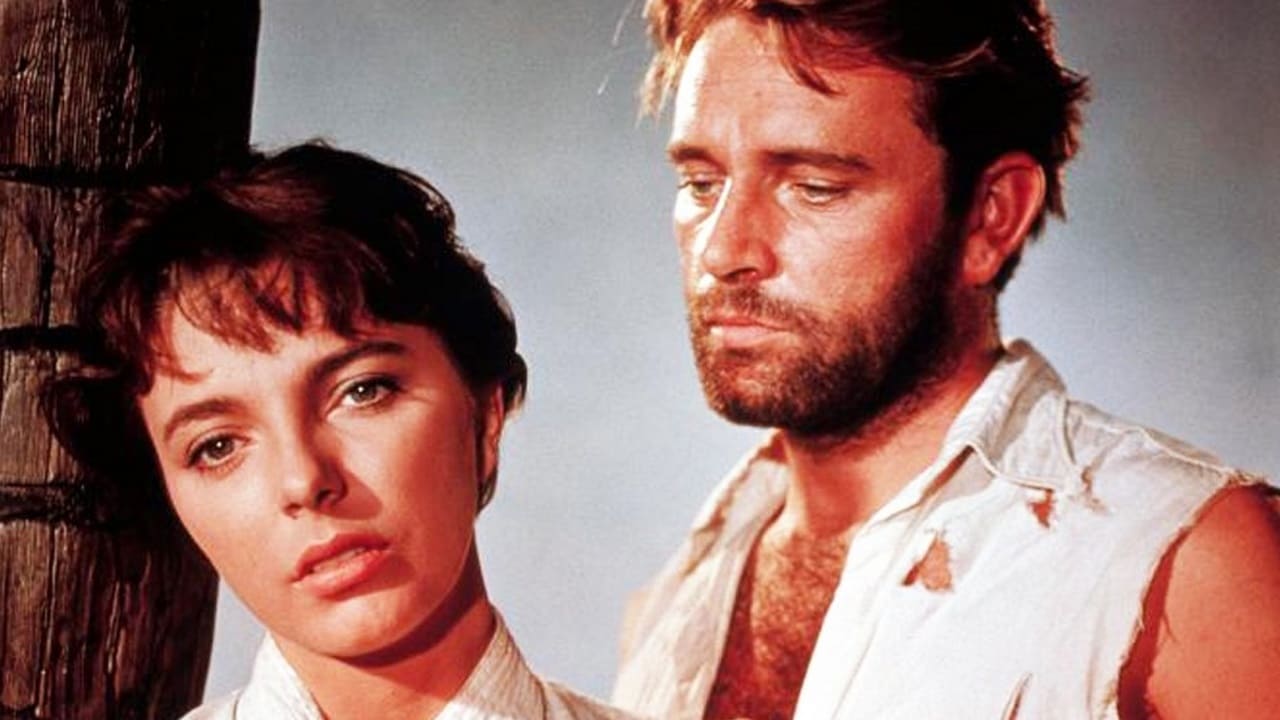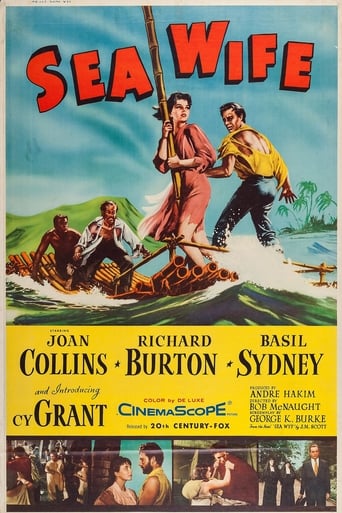

In the 1950s Joan Collins made two films in which she played a survivor of a shipwreck; in both she is marooned on a deserted island along with three men. The first was that fatuous "comedy" "Our girl Friday", aka "The Adventures of Sadie" from 1953. "Sea Wife" from four years later is essentially an attempt to make a serious drama out of a similar scenario.The film opens in London during the years immediately following the end of the Second World War. A young man signing himself "Biscuit" places advertisements in the personal column of various in which he asks a woman referred to as "Sea Wife" to get in touch with him. He never, however, receives a reply from her, and their story is told in flashback. The scene shifts to Singapore in 1942. The young man, whose name is Michael Cannon, is one of a group of British refugees trying to flee before the city falls to the Japanese Army. His ship is torpedoed by a Japanese submarine and he finds himself on a life-raft with two other men and a young woman. After a number of adventures the four survivors end up on a deserted island.The four are known to one another by nicknames; Cannon, whose nickname is "Biscuit", is the only one to reveal his true identity to the others. The woman is "Sea Wife", from an archaic word for "mermaid". The two other men are "Bulldog", a middle-aged British colonial, and "Number Four", the ship's black purser. On the island there are two developments. A powerful dislike grows up between the bigoted racist Bulldog and Number Four, and Biscuit falls in love with the beautiful Sea Wife, although she rejects his advances.Some reviewers on this board have expressed surprise that Sea Wife does not reveal her secret, namely that she is really a nun. (Her real name, or at least her "name in religion", is Sister Therese). This secret is already known to Number Four but not to the others. It is fairly obvious why she does not to reveal this to Bulldog, an atheist who is just as bigoted about religion as he is about race. (She has already upset him by trying to discuss her Christian faith with him). What is less clear is why she does not reveal it to Biscuit; perhaps she does not trust him not to reveal it to Bulldog. She contents herself with telling him that she is "promised to another". This is not an outright lie, because by the "other" Sea Wife means God, but Biscuit understands- as she clearly intends him to- that there is another man in her life.Some have also expressed surprise at the idea of Joan Collins playing a nun, but this is only an example of miscasting when seen in retrospect. Today we tend to think of Collins in terms of the sort of sultry villainesses she played in the seventies and eighties such as Fontaine Khaled in "The Bitch" and "The Stud" or Alexis in "Dynasty", ladies one could never imagine taking the veil. Earlier in her career, however, she had a much wider range, and could equally well turn her hand to virtuous young heroines. Indeed, she played such a character in a film as late in her career as "Quest for Love" in the early seventies. In 1957, therefore, there was no reason why she should not have played a nun.Of the two strands in the plot, the Biscuit/ Sea Wife story is perhaps the less interesting to modern audiences. It might have been better had Biscuit known of her profession or had there been any indication that she was torn by a genuine conflict between her emotions and her religious vows. The characters are played by the film's two big-name stars, Collins and Richard Burton, who by all accounts did not get on with one another. It is said that Collins, when asked what she thought might have happened had she rather than Elizabeth Taylor been cast as the lead in "Cleopatra", replied "Well, I certainly wouldn't have run off with Richard Burton!" It is therefore perhaps unsurprising that there is little chemistry between them.Of perhaps more interest to us today is the Bulldog/Number Four relationship. Their nicknames are both significant. The bulldog has long been a symbol of British patriotism, and this Bulldog is a patriot of a particularly snarling, aggressive breed. Number Four's nickname suggests that because of his race he ranks fourth and last in this society of four people, even though he is intelligent, resourceful and does his best to assist the others, perhaps even saving their lives. Bulldog, however, finds it impossible to accept him as an equal and becomes obsessed (without any evidence) by the idea that Number Four intends to rape Sea Wife. It is this obsession which leads to the final tragedy. Such a frank analysis of racism is perhaps unusual in a British film from this period; even when the cinema took on the subject of colonialism it was rare to make a white character a racist villain in this way. For me it was this aspect of the film which added some interest to what could otherwise have been a rather dull melodrama. 6/10
... View MoreSo runs the mantra of the shipwrecked racist "Bulldog" when he realises that one of his fellow castaways - the unbelievably handsome Mr Cy Grant,better - known for singing calypsos on the BBC "Tonight programme - has found a machete on the island where he finds himself marooned along with a nun(Miss Joan Collins) and a British officer(Mr Richard Burton).Mr Grant,formerly Steward of the ill - fated ship sunk by the beastly Japs is the only one who even remotely has his act together and so is obviously doomed to a fairly early demise.But not before he has set male and female hearts a - flutter by baring his well - oiled chest and sylph - like figure all over the island. He meets a particularly grisly end at the hands - or mouth I suppose,to be more accurate - of a passing shark as he swims out to board the raft that "Bulldog" has launched into the water having temporarily incapacitated the more liberal Mr Burton who did not share his unpleasant prejudices.Miss Collins contented herself with whispering ineffectually,a technique she adopts throughout the picture. Mr Burton gives one of his more offhand performances in a career of giving offhand performances.He is convincing as neither a British officer,a castaway, or as the ardent seeker of a lost love.As he walks towards a bus stop (!) at the end he looks like a man who has temporarily misplaced his latch - key rather than one who has just seen the only chance of finding true lurve going up in a puff of smoke. In a scene that will surprise nobody he walks straight past Miss Collins dressed in her nun's kit.Cue violins and swelling orchestra as Miss Collins gazes heavenwards in an ending that leaves Camp struggling to catch up.
... View MoreI picked the wrong one. I am not an art or movie critic, but I know what I like. And this wasn't it. It was an incredibly long morality tale, told in a huge flashback. All I can say is that if I am stuck in a lifeboat, and some guy starts talking about the inevitability of having to suck the blood out of some still-living victim within five minutes of going overboard, there is going to be one less psychopath in the boat the first time I get my hands on an oar. Come to think of it, the movie would have been much better if the "negro" Number 4 had just brained Bulldog the moment he he started mouthing off. Instead I had to sit through almost another hour of the noble, long suffering savage versus the racist moron. With the dreadfully serious Romantic leads chasing after each other the whole time like the lovesick couples in teen slasher movies. She leads him on with cryptic excuses, while he pleads his undying love to the cold maiden. A simple statement like "I'm a Nun" would have put his hormones on ice real quick. But no. Then you wouldn't have him pining for her through the whole damned movie. Oh, and to top it all off, at the end of the film, he walks right passed her without noticing her dressed as a nun, as he has just been told that she is dead, and she doesn't bother to say "hi", or "hello", or "here's the reason I couldn't jump you on that island..." No. She mutters something about nobody looking at nun's faces to her fellow nun, and walks off. Of course nobody looks at their faces. We all look at their dresses, and wonder if they really have feet under there...
... View MoreJoan Collins is a nun (!!) shipwrecked on an island with Burton. This movie is hilarious and sexy. Burton as usual is so serious he's got his tongue in his cheek because the script's morality won't let him use it to plow the ever-gorgeous Collins. I haven't seen it for years, but I still use Burton's growling "I love you, Sea Wife" to make my wife laugh. And a note on Collins: Evidently the eternal self-pitier Russell Crowe was upset to see himself compared to her at an awards show. But she is the one who was shamed; she was, is, and will always be wonderful. Enjoy this flick and "Land of the Pharoahs" as proof!
... View More